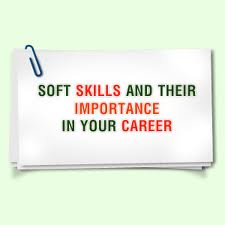
Soft skills signify to the cluster of personal qualities, attitudes, habits, which have potential to make someone good student and compatible with needs of academia. The ways, in which you talk, you move around, listen and present yourself. They are learned behaviours, which create as result of one’s eager and commitment to understanding emotions of oneself and others. Emotional Intelligence is another term used in indication to soft skills. Students who encompass such skills are more skilful and academic knowledge. They are able to increase additional understanding of tasks and successfully involve with them, allowing them to gain more control over learning. Also playing the significant role in development of students’ on the whole personality and performance, soft skills also amount to good skills in communication; presenting information in clear and brief manner; group discussions; leadership; time management; team-building ability; and interviews and interpersonal skills. All of which are significant for students’ academic development and growth.
Nowadays, employers wish more from employees, especially those which qualify as graduates. What they desire are individuals who encompass a good amount of ‘soft skills’. They are characteristics of the personality which are coming to front position as professional benefits - problem solving, teamwork and adaptability to change. Truth is, we have changed to society where it is significant to have knowledge but also significant to have skills to deal with people, determine solutions to problems and be adjustable in the world which is shrinking rapidly to meld more multiculturism at work place. “There is a saying that hard skills will facilitate you to do well in academia and in interviews, but it is soft skills which get you the job.”
Soft skills are describe how sensitively intelligent and involved we are. It is very hard to separate two, hence, it is expected to expect there to be some interaction between soft skills and emotions, mainly in case of learning. For instance, how students’ learn and comprehend information goes beyond standard ability to modify and regurgitate factual information.
Learning is emotional experience – what students keep from being academically showing is very much affected by precedent experiences of learning. Depending on nature and pleased by these memories, new learning can cause individuals to experience spells of sadness also happiness. Evenly, emotions can also influence students’ approach and motivation to learn. Observe how when student is undergoing personal difficulty, they illustrate signs of distractibility, or may lack ability to focus and stay on task. Much of this can be described by engineering behind significant cognitive processes.
Cognition means the approach in which we make sense of environment, and process information around us. Learning, as one would visualize, expends great deal of cognitive effort. Though, cognitive effort is not fixed and completely functionally at all times – it is subject to altering situations. When we are feeling emotionally challenged, this hinders with our ability to process and understand information. For these reasons, it is significant for teachers to develop a positive, emotionally safe learning environment to give for optimal opportunities to learn. Learning how to administer feelings and relationships comprises as emotional intelligence which covers the way for academic growth.
How soft skills complement hard skills
Usually, hard skills were regarded as being the most significant element of academic success. Hard skills are academic abilities, experience, and ones level of expertise.
Research recommends that hard skills contribute mere 15% to one’s skill success, compared to 85% which includes soft skills. It is at this point where ‘hard’ and ‘soft’ skills meet. Hard skills are frequently related with general intelligence – there is the element to them which is fixed and consistent throughout students’ academic history. Though, the same can’t be said in case of soft skills – they are flexible and can be created through commitment and systematic practice. Until recently, soft skills were almost unheard of, and for many they were thought as insignificant, mainly in terms of their use in academia. Though, today, student experience is richer and more differed than it has ever been. This is reflection of skills set which employers are searching for in employees to make sure their commercial survival in ever changing and global world – it is search for right candidate, with right skills, who is accessible at the right time.
Soft skills are significant for fine tuning student’s attitude to motives, learning, values… and deal with different circumstances sensibly and diligently. Emotional intelligence and soft skills build up students from within, which creates them a good predictor of academic success.
These skills authorize them to know who they are and how best they can come across as proficient individuals in any given circumstances. As studying and gaining credentials is frequently embarked upon to improve employment prospects, it Is predictable that employers will factor this into their criteria when selecting appropriate candidates. Therefore, the skills which students are exposed to and expected to practice in academia must be representative of, and fulfil needs of business world.